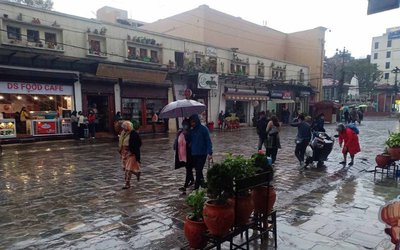
The government to government and people to people relations between Nepal and Japan have contributed a lot in managing disasters. As Nepal is in the disaster cluster of Citynet with Yokohama, Kathmandu is getting a lot of technical support from Yokohama.
As Nepal is in the process of reconstruction, experts from Yokohama city have been offering technical and other expertise to Kathmandu Valley. Only recently, high officials from Yokohama city conduced training for the officials of 14 municipalities of Kathmandu Valley.
This training teaches how earthquake resilient buildings are constructed and how officials of municipalities can support people at the time of crisis.
Along with providing support to build earthquake resilient structures, Yokohama city officials have already launched programs on resilient school buildings in Kathmandu, Lalitpur and Bhaktapur.
Under the program are Arundha Lower Secondary School, Next Generation Resident Academy, Prabhat Secondary School, Whitefield Higher Secondary School, Lalitpur Sub-metropolitan City, Bhasara School, Madan Smarak High School, Mistra Primary School, Tri-Padma Vidyashram, Evergreen Higher Secondary School and Ganesh Primary School.
CITYNET Yokohama Project Office belongs to a network of local governments in Asia-Pacific called CITYNET which was established in 1987 with the support of UNESCAP and UNDP.
The network currently has 131 members in the Asia-Pacific region which consists of cities, institutions, academias, organizations and NGOs. The main purpose of the network is to promote sustainable development in the region through city-to-city cooperation while engaging with various related stakeholders.
CITYNET operates its activities under its four main clusters, Climate Change, Disaster, Infrastructure and MDGs.
The project on Disaster Prevention Education and Awareness for Schools was proposed by CITYNET Yokohama Project Office to Toshiba International Foundation in the aftermath of the April 25 Great Nepal Earthquake which wiped out several towns completely and inflicted serious damages in the metropolitan areas. Over 8,000 people lost their lives, many of them children.
A large number of school buildings which withstood the shock of magnitude 7.8 has been identified as ‘unsafe’ to use. With limited funds to reconstruct or renovate, classes are being conducted in the open areas or in tents where the learning conditions are poor.
To better understand the mechanisms of the earthquake and to be able to take necessary precautions and preventive measures, the project focuses on disaster prevention education in schools using commonly available goods. Eleven schools from 4 municipalities were selected as a pilot group of teachers who have undergone training starting August 2015.
Yokohama’s project aim is to share lessons learnt in Japan through major earthquakes and develop local solutions for Nepal through education and awareness.
Prior to the earthquake, Nepal had little or no technical literature or knowledge on the mechanisms of the types of disasters that may occur at any given time or place. Most of the material was also produced outside of Nepal and was not localized to the Nepalese context.
This background information was crucial in order to develop and design the method of teaching that the teachers would receive on how to properly educate the children on disasters particularly on the earthquakes that may happen in Nepal.
The workshop offered to the teachers in Nepal included methods of developing better educational material and tools including visual aids and physical exercises. Through the practices conducted in Japan, Plus Arts introduced various techniques based on games.
As heavy rains have caused significant flooding in the different parts of Nepal affecting people living in overcrowded camps and temporary shelters, and impeding road access to remote communities, Yokohama city’s training is offering some relief.
Since Nepal continues to be vulnerable to disasters, the integration of disaster risk reduction and response into the education system is paramount for the future. Yokohama City and Kathmandu Metropolitan are working side by side to make Kathmandu’s buildings and schools resilient to earthquake.

Keshab Poudel
Poudel is the editor of New Spotlight Magazine.
- KUL MAN GHISING: Bowing Down To The People
- Apr 13, 2025
- POLITICAL VIOLENCE: Culture of Impunity
- Apr 11, 2025
- PM OLI MEETS PM MODI: No Progress
- Apr 09, 2025
- PM OLI’S THAILAND VISIT: Flip Flop
- Apr 08, 2025
- FM Dr. Deuba’s India Visit: Mission Aborted
- Mar 26, 2025














